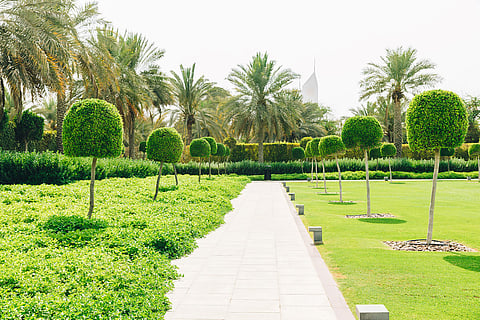EGA Begins Construction Pilot Plant to Convert Bauxite Residue into Manufactured Soil
Emirates Global Aluminium has announced the start of construction of a pilot plant to convert bauxite residue, a waste stream from alumina refining, into manufactured soil. The pilot plant is thought to be the first-of-its-kind in the world.
Construction follows five years of scientific research & development by EGA and a consortium of global research partners, which led to a breakthrough in the re-use of one of the aluminium industry’s most challenging waste streams. EGA has spent the last year on detailed engineering work.
The pilot plant will use EGA’s proprietary technology to neutralise caustic bauxite residue into an environmentally benign raw material in hours, instead of undergoing decades-long, natural processes. This Optimised Bauxite Residue is the main ingredient for the manufactured soil, which EGA calls ‘Turba’ (the Arabic word for soil).
The pilot plant will prove the potential to industrialise EGA’s revolutionary process and will give the company the ability to conduct large-scale trials to test plant growth using the manufactured soil. It is expected to be completed during 2024.
Laboratory-scale trials have already shown that Turba significantly enhances plant growth while using less water and fertiliser than local sandy alternatives. The pilot plant will be capable of producing up to six tonnes per day of optimised bauxite residue.
Abdulnasser Bin Kalban, Chief Executive Officer of Emirates Global Aluminium, said: “The construction of this pilot plant is an important milestone in our drive to find productive uses for bauxite residue, which has been a challenge since the dawn of our industry.
"Manufactured soil has great potential as a solution, as it meets an important need in the UAE. Our goal is to develop and prove multiple solutions, to ensure all bauxite residue produced in the UAE is used in the UAE, contributing to a more circular economy.”
Some 150 million tonnes of bauxite residue are thought to be produced worldwide every year with less than two percent put to productive use. Untreated bauxite residue is caustic and does not support plant life.
The plant, which will be located at EGA’s site in Al Taweelah in Abu Dhabi, will cover an area of 900 square metres when complete, and will contain 230 tonnes of steel, more than two kilometres of piping, and 10 separate tanks. The heart of the plant, a specialised filtration system, was built in Finland and arrived in the UAE in June.
The UAE has limited naturally-occurring soil, and imports significant quantities each year for greening and agricultural purposes. Soil is considered a non-renewable resource as it takes centuries to develop naturally in even the most favourable climates.
The world’s soil naturally absorbs some 20% of man-made CO2 emissions every year, making soil the largest terrestrial CO2 storage facility and critical for the global effort to avert the worst impacts of climate change. Soil’s CO2 absorption capability is under threat globally from human-driven soil erosion.
Early studies show that EGA’s Turba may have up to 10 times better CO2 absorption properties than the UAE’s natural soil.
EGA began production at Al Taweelah alumina refinery in 2019, making alumina refining a new industrial activity for the UAE. EGA is fully committed to finding productive uses for bauxite residue within the UAE.
EGA’s bauxite residue team has already developed other potential novel applications for bauxite residue, including as a raw material for the steel, cement, and construction industries.
EGA has already developed re-uses for other waste streams from its industrial activities.
These include spent pot lining, a by-product of aluminium smelting, which is re-used as an alternative feedstock and fuel by the UAE cement industry; carbon dust, which is also used as a fuel in cement manufacturing; and dross, which is processed to recover aluminium. EGA’s long-term aspiration is to send zero process waste to landfill.


